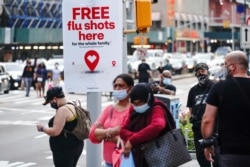COVID-19 deaths in the U.S. are approaching 200,000 as Minnesota, South Dakota and other U.S. states grapple with surges in infections and rising death tolls.
The Johns Hopkins Coronavirus Resource Center reported Saturday afternoon that there were 30.6 million COVID-19 cases worldwide with more than 950,000 deaths.
The U.S. had more coronavirus infections than any country, the Johns Hopkins center said, with more than 6.7 million, followed by India with upward of 5.3 million and Brazil with nearly 4.5 million.
The U.S. also led the world in COVID-19 deaths, with more than 199,000, Johns Hopkins said.
Meanwhile, American health officials warned the public to get flu shots this year to avoid having to deal with COVID-19 and the flu simultaneously.
Both are highly contagious, and they have similar symptoms. The flu, however, is seasonal, while COVID-19 does not appear to have a timeline as it snakes around the world.
While there is no COVID vaccine yet, flu shots have been available for decades.
The only way to determine if someone has one or both of the illnesses is through laboratory tests.
'Very tough year'
Gary Simon, director of the Division of Infectious Diseases at George Washington University in Washington, told The Washington Post the prospect of trying to beat back both diseases was making 2020 “a very tough year.”
European countries announced new coronavirus restrictions Friday, one day after the World Health Organization warned infections have started to spread again across the continent at “alarming rates.”
In Spain, which has more cases than any other European country with more than 640,000, the regional government of Madrid ordered a lockdown effective Monday in some poorer areas after a spike in infections there. While movement in the area will be restricted, people will still be allowed to go to work.
Authorities in Nice, France, banned gatherings of more than 10 in public spaces and cut bar operating hours, after new restrictions were imposed earlier this week in Bordeaux and Marseilles.
Britain said it was considering a new national lockdown after cases nearly doubled to 6,000 a day in the latest reporting week. British Health and Social Care Secretary Matt Hancock said another lockdown should be a last resort but that the government would do whatever was necessary to contain the virus.
Israel began a second lockdown Friday because of a sharp jump in the number of coronavirus cases.
The three-week-long restrictions come just as the country begins a Jewish holiday period.
Israelis are allowed to travel no more than 500 meters from their houses, with few exceptions.
'Red' Iran
In Iran, a senior Iranian official said the country should be on “red alert” after it reported 3,049 new cases Friday, the highest daily gain since early June.
“The color classification doesn’t make any sense anymore,” Deputy Health Minister Iraj Harirchi said in an interview with Reuters. “We no longer have orange and yellow. The entire country is red.”
Canada decided to extend the closure of its U.S. border to nonessential travel until October 21, after seeing an increase in infections in recent weeks. Canadian Public Safety Minister Bill Blair said Friday that such decisions would continue to be based on public health advice to protect Canada’s citizens. The closing was first announced March 18 and has been extended each month since.







